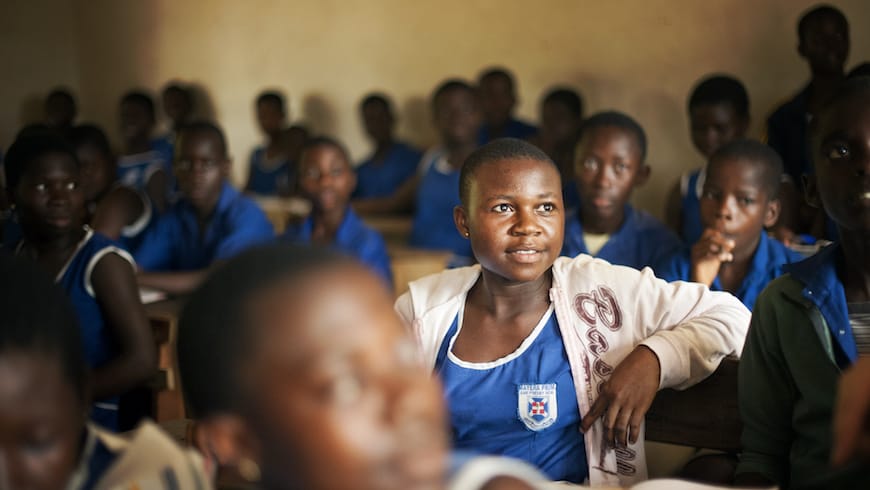Case Study: Big Catch-Up (BCU) Immunization Activities in Cameroon
Launched by the World Health Organization (WHO) in 2020, the Immunization Agenda 2030 (IA2030), envisions a world where everyone, everywhere, at every age benefits from vaccines for improved health and well-being. The strategy is built on seven key priorities:
-
- Integration of immunization within primary health care (PHC)
- Political commitment and strengthened demand for vaccination services
- Coverage and equity, targeting zero-dose and under-immunized children
- Life-course approach, ensuring immunization at different stages of life
- Resilience, enabling programs to respond to emergencies effectively
- Sustainability of vaccines, services, and supply chains
- Research and innovation to enhance immunization impact
Study Overview
The Big Catch-up (BCU) initiative developed by WHO, is an essential Immunization Recovery Plan aimed at intensifying immunization activities. Its core goal is to vaccinate zero-dose (ZD) and under-immunized (UI) children under five (born between 2019–2022) to close immunity gaps and restore routine immunization coverage to at least 2019 levels.
Through policy and systemic approaches, BCU seeks to:
-
- Institutionalize catch-up immunization within PHC
- Strengthen immunization systems, ensuring resilience and sustainability
- Accelerate progress toward IA2030 objectives
WHO has developed a Monitoring, Evaluation, and Learning (MEL) Strategy (MEL framework) to help countries track the implementation and impact of BCU activities. This framework includes:
-
- Readiness monitoring to assess preparedness
- Leveraging administrative health data for ongoing tracking
- Targeted assessments and real-time monitoring
- Case studies, surveys, and evaluations
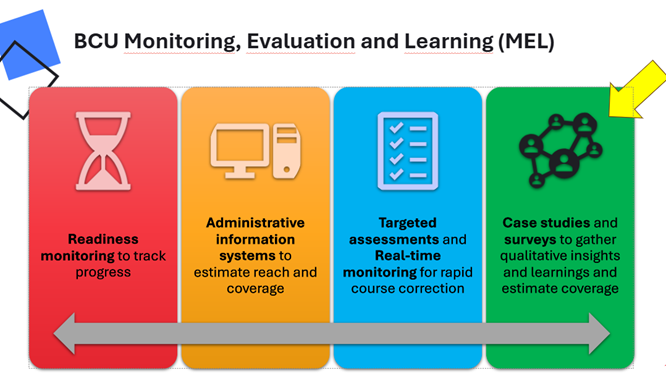
The Alliance for Health Policy and Systems Research has funded case studies in five countries (Cameroon, Nigeria, Tanzania, Pakistan, and Yemen) to support MEL strategy implementation.
BCU Implementation in Cameroon
Cameroon has faced significant immunization challenges, with close to two million zero-dose and under-immunized infants recorded in the past five years. Contributing factors include:
-
- Health system constraints
- Misinformation and vaccine hesitancy
- Conflict and instability
- Disruptions caused by the COVID-19 pandemic
These gaps have led to measles and polio outbreaks, reinforcing the urgent need for intervention.
EVIHDAF’s Role in the Case Study
In response to these challenges, EVIHDAF, in collaboration with the Ministry of Public Health (MoH) through the Expanded Program on Immunization (EPI), is leading the implementation of the Big Catch-Up Immunization Case Study in Cameroon. This eight-month study (May – November 2025) aims to generate evidence from Cameroon’s catch-up vaccination activities, offering insights that will inform national immunization policies and strategies.
EVIHDAF is working to:
-
- Assess BCU planning, implementation, successes, and challenges
- Identify barriers and facilitators of immunization coverage
- Examine financial investments supporting routine immunization programs
This case study approach enables a deep dive into country experiences, providing lessons on implementing essential catch-up vaccinations within PHC frameworks.
The theory of change for essential catch-up vaccination depicted in the Figure below will guide our investigations. It includes a series of inputs, country activities including readiness and implementation, and expected intermediate and longer-term outcomes
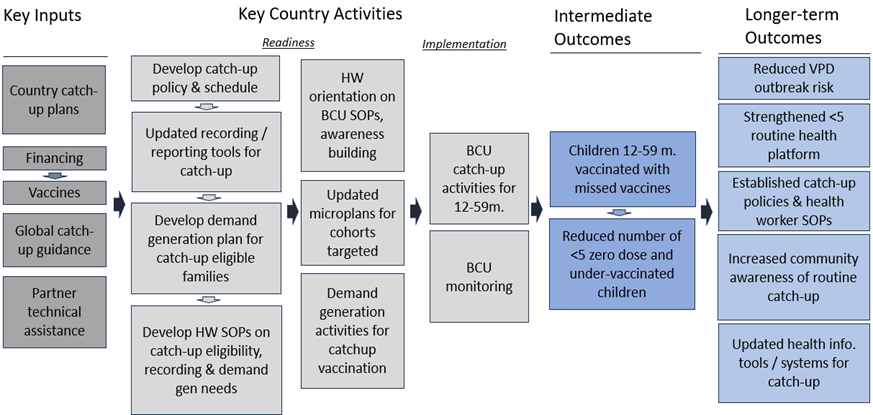
Study Objectives
General Objective
To understand and generate evidence from Cameroon’s implementation of catch-up vaccination activities.
Specific Objectives
EVIHDAF will investigate:
- Planning, implementation, and monitoring of catch-up vaccination for children 12–59 months who have missed one or more nationally recommended vaccine doses.
- Strategies to identify and reach missed children, ensuring institutionalized catch-up immunization within PHC.
- Barriers preventing some children from receiving vaccinations—whether through routine or catch-up initiatives.
Study Methodology
A cross-sectional mixed-method approach will be employed, consisting of:
- Desk review of program documentation and implementation data
- Primary qualitative and quantitative data collection, including Key informant interviews; Focus group discussions and Surveys
- Data extraction from health facility registers
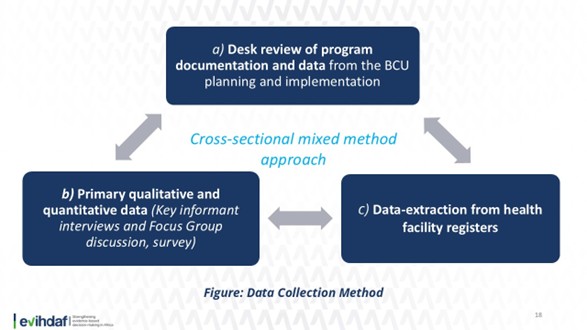
Additionally, the study will begin with comprehensive stakeholder mapping and engagement, ensuring meaningful integration of findings into policy decisions and immunization strategies.
The figure below illustrates the study’s completion milestones, outlining its four key phases—Kick-off & Preparations, Data Collection, Data Analysis, and Wrap-up—along with their anticipated execution timelines.
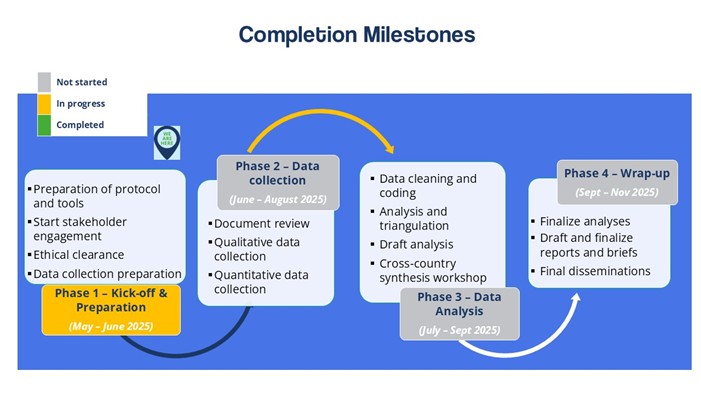
Snapshot
Study Title: Case Study of Big Catch-Up (BCU) Immunization Activities in Cameroon
Study Area: Cameroon (Centre, Littoral, South-West & Far North regions)
Project Date: May – November 2025
Funder: Alliance for Health Policy and Systems Research (AHPSR)
Implementing Partners: EVIHDAF; Expanded Program on Immunization (EPI) / MINSANTE
Target: understand and generate evidence from Cameroon’s implementation of catch-up vaccination activities.
Others Projects
Projects Activities
Coming Soon ….
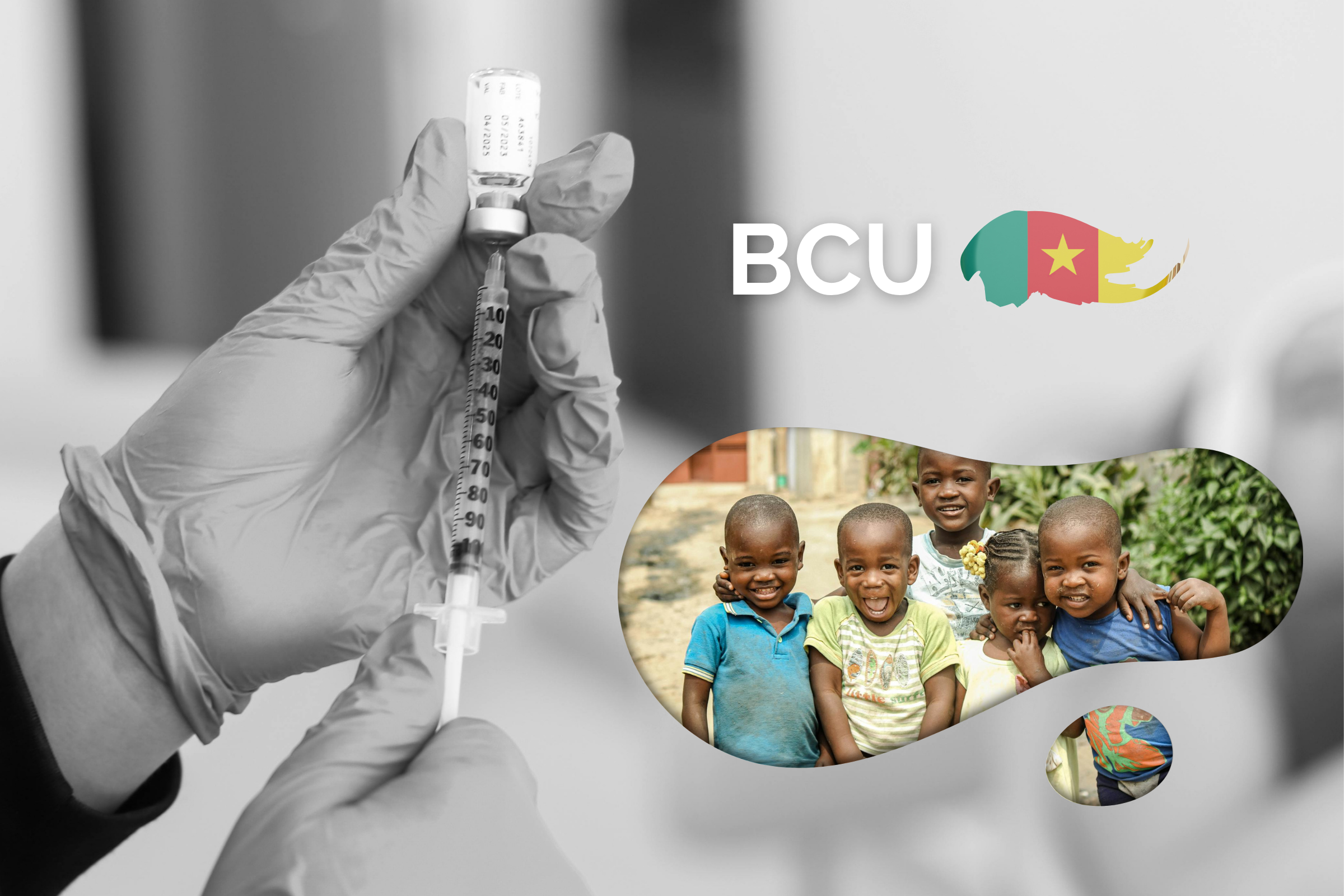
Big Catch-Up Immunization Activities in Cameroon
